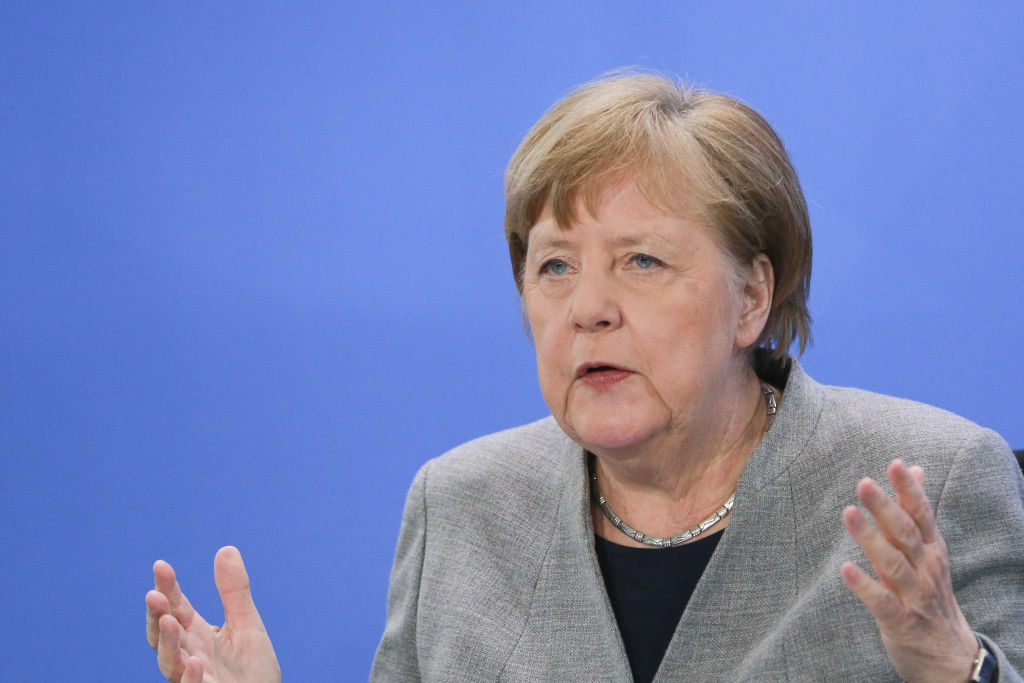Germans eagerly awaited Angela Merkel’s announcement this week about a potential exit strategy for Germany, the country with one of the lowest Covid-19 death rates in Europe. Many Germans expected a turning point and a possible return to everyday life. What they got was only a first small step back to normal.
Initially the chancellor said that the lockdown would be eased if confirmed coronavirus cases only doubled every tenth day. The current doubling time is over a month. But Merkel and the 16 state prime ministers jointly decided to extend most of the measures until early May. Only shops and retailers up to a size of 800 square metres, zoos, libraries, and car dealerships can reopen soon. Hotels, theatres, cinemas, and churches remain closed until further notice.
There’s one word to describe German politics at the moment: caution. The chancellery in Berlin is afraid of a coronavirus rebound if all restrictions are lifted too soon. And politicians know that once certain restrictions are lifted they can probably never be put back in place again. Once kids are back in school, it will be incredibly hard to send them back home before the summer break. Once people go back to work it will be difficult to convince them that another lockdown is justified.
Experts argue that as long as there is no vaccine the basic reproduction number has to be 1.0 or lower. Currently, the number is at 1.0 in Germany. If, however, the number rises to 1.2 again, Germany’s healthcare system might collapse by mid-July. That’s exactly what Merkel tried to explain to the public in her televised announcement on Wednesday. She warned that the country had only achieved a ‘fragile, partial success’ against the coronavirus outbreak
Instead of a political statement from the chancellor, Germans received a technical explanation from Merkel, the former scientist with a PhD in physics. That’s not unusual for her. Some of her political companions say that the only time she made a gut decision was when she didn’t close the borders in late-summer of 2015. In this current crisis, it might not be the worst thing to have a government leader that primarily believes in numbers and statistical models. What is worrying, however, is how German health experts have disagreed with one another throughout the past two months.
The Robert Koch Institute (RKI), Germany’s disease control agency, has opposed the idea of reopening day-care centres and schools because kids could not keep distance from one another. Leopoldina, a national academy of the sciences, recommended reopening schools for young pupils who run a low risk of getting infected. On Wednesday, politics decided that schools will slowly reopen after 3 May, with pupils in their last years of primary and secondary school having the priority.
Merkel’s government consults with several institutes including the RKI and Leopoldina, but none of them knows for sure which restrictions are necessary and which aren’t. Their recommendations are mostly based on estimations and predictions. Scientists can work with empirical data but are currently bound to do a lot of guesswork. That leaves the door open to those scientists who think it’s the perfect time to enhance their national profile.
At the beginning of the crisis, Christian Drosten, the head virologists of the Charité Berlin hospital, became the leading voice of his profession in Germany. His statements are calculated and nuanced. If he is not sure about something, he admits it. In a way, Drosten resembles Merkel. When the curly-haired 48-year-old turned into a media darling, he felt increasingly uncomfortable in his role because he doesn’t like the attention that he as a person is receiving.
Now others smell their chance to become Germany’s most trusted coronavirus expert. Particularly Hendrik Streeck, an outspoken virologist from the University of Bonn, who has tried to fill Drosten’s shoes but received heavy criticism when he prematurely released a research study about the Heinsberg region where the first virus fatalities occurred. The third man is Alexander Kekulé, an elder statesman among biochemists, who criticised the government for how long it waited before a school closure was decided. Kekulé also criticised Lothar Wieler, the head of the RKI, because of how long his institute waited before it flagged the coronavirus outbreak as a serious threat to Germany. Wieler himself is a high-profile player being well-connected to government officials in Berlin.
Since these and other experts cannot agree on anything, the situation becomes quite messy, particularly for Merkel who is determined to act on facts rather than instinct. That’s why she will remain cautious until there is bulletproof evidence, which goes to show that even a country that has handled the crisis relatively well struggles to ease the lockdown.






Comments